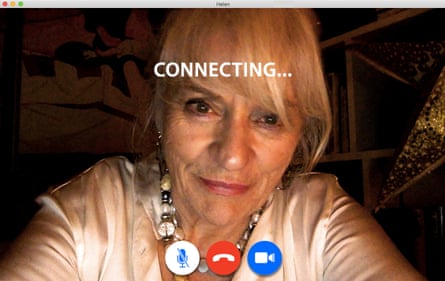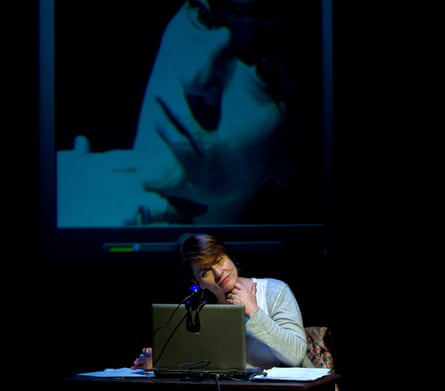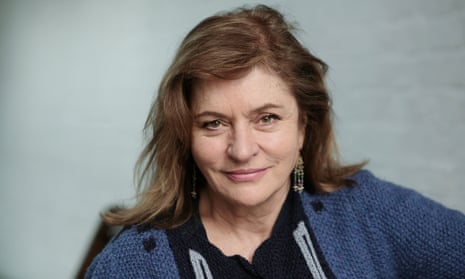In early March, Diana Quick tripped on the strap of a bag and broke her kneecap. She was alone in north London and decided she’d be better off hunkering down in her countryside home after hearing murmurs of the Covid-19 lockdown. So later that month, “a friend drove me to Suffolk and left me here”.
It means her lockdown began early but it has got easier. Her knee is on the mend, she has planted vegetables in the garden and she has been joined in Suffolk by her daughter, Mary Nighy, and her family. (Mary’s father is Bill Nighy, Quick’s former long-term partner.)
“I feel privileged,” she says. “I have a large garden with the family and the dog around me. I have some friends who are on their own. I spoke to one and he said, ‘What I really want is a cuddle.’”
It has been a surprisingly productive period, despite the knee brace and crutches. Quick plays the lead in a drama, streamed by the Donmar Warehouse this week, that chimes with our state of isolation. Midnight Your Time is a one-woman play by Adam Brace, about a retired lawyer who is at home and having a remote, one-way conversation with her daughter, in Palestine, through video messages.
Quick first performed the role in 2011, directed by Michael Longhurst, now the artistic director of the Donmar. This time they have worked together remotely, with Quick using a webcam. The role has resonated with her: “As a mother, I relate in ways, having been through the empty-nest experience and also around saying, ‘Sorry, I’m in the wrong’ as a mother.”

There are things to be learned from lockdown, she thinks, particularly when it comes to the climate. Quick has backed the Green Party (she endorsed Caroline Lucas’s parliamentary candidacy in the 2015 election) and thinks this period could, at best, inspire a long-term re-evaluation of the way we run the planet, as well as our own lives. She has been campaigning against proposed plans for a new nuclear power station at Sizewell, on the Suffolk coast.
Quick comments on how the lockdown has enabled some people to slow down and appreciate nature. “And people who have been rushing around too much have maybe found that they can manage with a lot less than they thought they needed – or that they need different things.”
Quick’s work as an actor has ranged far beyond her best-known role as Lady Julia Flyte, in the 1981 TV adaptation of Brideshead Revisited. Now 72, she was working on a new sci-fi Netflix show, The White Horse, when the pandemic brought a stop to filming, and was also adapting a Wilkie Collins novel, Jezebel’s Daughter. “It’s a rip-roaring tale with a very strong woman at its centre. It deals with care and madness and not locking people up but having them in society.”
Her career started early – she was heavily involved in youth theatre by the age of 17 and became the first female president of the Oxford University Dramatic Society. Youth theatre gave her a head start, she says, and she performed alongside Terry Jones, Michael Palin and Annabel Leventon at Oxford.
Motherhood came at the age of 37. “I was the main breadwinner when Mary was little. If work involved going away, only one of us [Quick or Bill Nighy] would go. Of course, this meant turning down some jobs, although Mary would probably say I was absent a lot. I had that usual thing of getting up early and going to bed late so that you’re frazzled.” Her generation of men, she adds, were not invested in doing the housework. “We had to ask. The effect for me was that I became ingenious at finding paid work so that I could then pay people to do the things that I didn’t have time do to.”

She now has a grandchild, with another on the way. Being a grandmother is great, she says, “but not something I was longing for. I’ve been very happy being a mother, enjoying my daughter’s life as a grownup. When she told me she was pregnant for the first time, I thought I was too young to be a grandmother, although I wasn’t really.”
Mary is also an actor and film-maker now, although Quick and Bill Nighy advised her not to follow in their footsteps. “We both said, ‘Only do it if you can’t not do it’ and ‘Don’t think it’ll be an easy ride.’” But Mary is, she says, “very gifted” and things worked out. “She’s doing amazingly well. She’s had a really good year of work and is back to having a baby again, but I also see that it’s a constant juggle.”
Have things got easier for women in her industry? Quick has always been engaged with feminism and feels that the gains of second-wave feminism have led to improvements in the workplace, but there is still the Sisyphean struggle to fit motherhood into a career. “Female directors were a rarity when I started out and things have improved a lot, but many of the final choices are still being [made] by male executives. And there is still the same old problem of work-life balance when children come along. It continues to be a battle.”
Midnight Your Time is on the Donmar Warehouse’s YouTube channel on 13 May at 7.30pm and then available for a week.

Comments (…)
Sign in or create your Guardian account to join the discussion